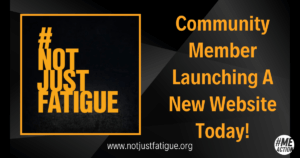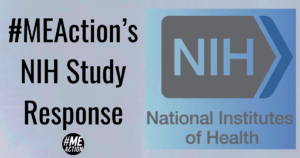There are a lot of moving pieces to keep track of as we push for our U.S. federal agencies to provide fair and adequate treatment to people with myalgic encephalomyelitis (ME). Together, our community continues to take action to fight for our lives, and we’re seeing the fruits of that labor.
At the NIH, we’ve scheduled a meeting to discuss our demands with Francis Collins for Dec. 7th; and the CDC wants to meet with us to discuss our recommended changes to its ME/CFS website.
In other areas, we must dig in and keep on demanding justice. The CDC has awarded the literature review contract to the EPC, which has failed our community in the past; and the HHS secretary has passed us off to its assistant secretary to follow-up about the sudden dissolution of CFSAC. The FDA is reviewing compounded substances to determine whether to continue to allow their use in compounding, or ban them. People with ME must speak up about compounded substances that are important to them.
Read on for all the details!
Centers for Disease Control and Prevention (CDC)
- Changes to the ME/CFS website: The CDC has responded positively, and suggested we set up a meeting to discuss our proposal that specific changes be made to their ME/CFS website. We are in the process of setting up a meeting now, and will keep you posted on the date!
#MEAction sent its recommended changes for the CDC’s ME/CFS website, which incorporated feedback from the community, at the beginning of October. Our recommendations urge the CDC to make clear the harms of graded exercise; place greater emphasis on the importance of pacing; and more accurately represent severe ME.
- Contract to conduct a literature review for ME treatment guidelines. The CDC has awarded the contract to the Pacific Northwest Evidence-based Practice Center (EPC), despite our petition of more than 8,000 signatures expressing concerns with the EPC.
Meanwhile, the CDC rejected #MEAction’s bid for the contract. We had submitted a bid to work in partnership with the New York State Department of Health AIDS Institute – the plan being for #MEAction to provide administrative oversight, and subcontract to the NYSDOH AIDS Institute to conduct the evidence review on ME.
The community had immediate concerns about the EPC since the EPC had previously conducted a literature review of ME for the Agency for Healthcare Research and Quality in 2014, and had recommended graded cognitive behavioral therapy and graded exercise therapy as effective treatments, failing to account for the use of the Oxford definition and other overly broad diagnostic criteria in its review.
A literature review for ME treatment guidelines is intended to synthesize the scientific evidence into a summary, and critically analyse the information by identifying gaps in current knowledge, showing limitations of theories and points of view, pointing to areas for further research, and reviewing areas of controversy.
We will continue to fight for the process to include expert practitioners and input from patients for the literature review that will shape our treatment guidelines.
Health and Human Services (HHS)
Our demand that the HHS secretary reinstate the Chronic Fatigue Syndrome Advisory Committee (CFSAC). HHS has responded that the HHS Secretary, Alex Azar, is too busy to meet with us, but has indicated that the HHS assistant secretary will follow-up with our request for a meeting.
After the HHS summarily dissolved CFSAC after declaring that it had accomplished its duties and the committee was no longer needed, our community rallied in protest. We collated your incredible photos and messages from the virtual protest and sent a letter to Secretary Azar demanding the CFSAC be reinstated, and that the secretary meet with us to discuss the situation.
You can take action now by telling Congress to establish a new ME/CFS Federal Advisory Committee through congressional action. Join the Congressional effort with the Solve ME/CFS Initiative using their one click.
National Institutes of Health (NIH)
We have scheduled a meeting! After much back-and-forth over scheduling, we have successfully scheduled a meeting with the NIH Director, Dr. Francis Collins, for Friday, Dec. 7, 2018, to discuss our demand for increased research into ME.
We sent Collins a letter this past May, following the global #MillionsMissing protest, that outlines specific mechanisms for the NIH to undertake within the next 12 months to reach three key goals. Our demands also include significantly ramping up research funding to be commensurate with the disease burden, which studies approximate at $190 to $250 million.
The meeting with Dr. Collins will include the following participants: Walter Koroshetz, M.D., Director, National Institute of Neurological Disorders and Stroke; Vicky Whittemore, Ph.D., Program Director, National Institute of Neurological Disorders and Stroke; #MEAction Executive Director, Jennifer Brea; #MEAction’s Director of Global Community & Campaigns, Ben HsuBorger; activists Terri Wilder and Mary Dimmock; patient and scientist, Dr. Becky Taurog, PhD; and patient and immunologist, Dr. Rochelle Joslyn, PhD.
This meeting is a direct product of your efforts to advocate for our needs! We could not have reached this important step forward without your advocacy. As always, we are grateful to this community and honored to work with you! Together, our voices are a powerful force for change.
Federal Drug Administration
The FDA is in the process of reviewing bulk substances used in IV therapies, injections, and oral compounds to determine whether or not they will remain legal or be banned from being used in compounding. (This process does NOT affect commercial supplement manufacturers – only compounded products.)
Even though oral or commercial versions of these substances are available, many people with ME are allergic to common fillers and require a clean, compounded version, or require a special dosage or format (to get them directly into our bloodstream, for example, in a case where our intestines are not able to absorb them).
Now, is the time to let the Pharmacy Compounding Advisory Committee know which compounded medications are important to you. (If the FDA does not hear from us, it is probable that the committee is not considering the needs of people with ME in its decision-making.) Take action!
Recent approvals and bans
The advisory committee is reviewing substances in groups of ten.
On Sept. 12, the committee approved these bulk substances for compounding: alpha lipoic acid (solid oral dosage); coenzyme Q10 (for oral administration); creatine monohydrate (solid oral dosage forms); and pyridoxal 5 phosphate (intravenous and oral dosage forms).
The committee recommended banning quercetin dihydrate for compounding, a substance that people with mast cell activation syndrome have found helpful.






2 thoughts on “Alphabet Soup: Read the Latest about our U.S. Health Agencies and M.E.”
Re the NIH meeting for increased research funding:
If someone is willing/able to make themselves available, may I suggest including a representative from the Senior’s Group in the team – preferably a long-term sufferer – in order to demonstrate the growing cohort of PwME who have spent many decades of their lives unable or severely limited in their capacity to work and contribute to society in a way that reflects their capabilities and interests, due to ME/CFS?
Those outside of the ME Community may be unaware of the impacts of the continuing, lifelong nature of this disease, and an older patient representative would be a clear reminder.
As well as the devastating personal cost to individuals, the NIH might like to consider that, with the recovery rate from ME estimated at around 5%, this ageing cohort will only continue to grow, translating to many thousands of years and many lifetimes’ worth of lost productivity, and a resulting ever-increasing economic loss to the Nation, unless determined efforts are made now to find a cure.
Those of us who are older. Have had ME for decades, and who are classified as ‘Severe M.E. Sufferers’ sadly cannot participate in anything! We long to brush our teeth-but the energy expenditure isn’t worth it. We have discontinued all doctors appointments because we just cannot get there-and doctors won’t come see us. I have maybe 50 lucid minutes every 48 hours. I look for treatments for M.E. during these minutes, and occasionally respond to items like this.
Comments are closed.